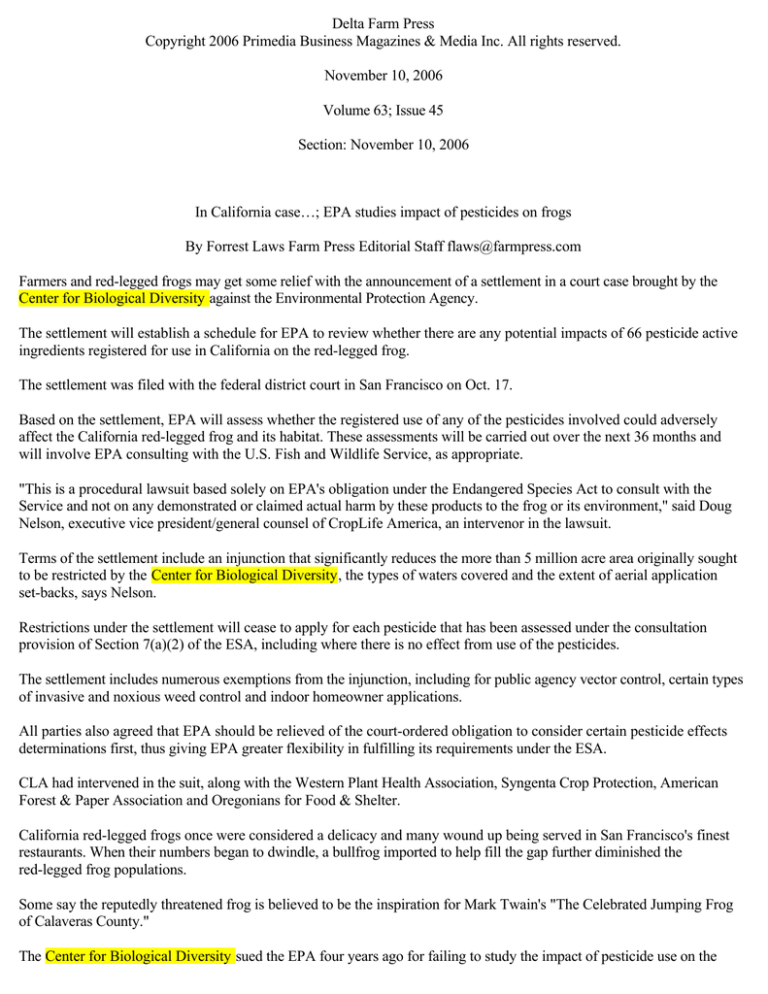
Delta Farm Press
Copyright 2006 Primedia Business Magazines & Media Inc. All rights reserved.
November 10, 2006
Volume 63; Issue 45
Section: November 10, 2006
In California case…; EPA studies impact of pesticides on frogs
By Forrest Laws Farm Press Editorial Staff flaws@farmpress.com
Farmers and red-legged frogs may get some relief with the announcement of a settlement in a court case brought by the
Center for Biological Diversity against the Environmental Protection Agency.
The settlement will establish a schedule for EPA to review whether there are any potential impacts of 66 pesticide active
ingredients registered for use in California on the red-legged frog.
The settlement was filed with the federal district court in San Francisco on Oct. 17.
Based on the settlement, EPA will assess whether the registered use of any of the pesticides involved could adversely
affect the California red-legged frog and its habitat. These assessments will be carried out over the next 36 months and
will involve EPA consulting with the U.S. Fish and Wildlife Service, as appropriate.
"This is a procedural lawsuit based solely on EPA's obligation under the Endangered Species Act to consult with the
Service and not on any demonstrated or claimed actual harm by these products to the frog or its environment," said Doug
Nelson, executive vice president/general counsel of CropLife America, an intervenor in the lawsuit.
Terms of the settlement include an injunction that significantly reduces the more than 5 million acre area originally sought
to be restricted by the Center for Biological Diversity, the types of waters covered and the extent of aerial application
set-backs, says Nelson.
Restrictions under the settlement will cease to apply for each pesticide that has been assessed under the consultation
provision of Section 7(a)(2) of the ESA, including where there is no effect from use of the pesticides.
The settlement includes numerous exemptions from the injunction, including for public agency vector control, certain types
of invasive and noxious weed control and indoor homeowner applications.
All parties also agreed that EPA should be relieved of the court-ordered obligation to consider certain pesticide effects
determinations first, thus giving EPA greater flexibility in fulfilling its requirements under the ESA.
CLA had intervened in the suit, along with the Western Plant Health Association, Syngenta Crop Protection, American
Forest & Paper Association and Oregonians for Food & Shelter.
California red-legged frogs once were considered a delicacy and many wound up being served in San Francisco's finest
restaurants. When their numbers began to dwindle, a bullfrog imported to help fill the gap further diminished the
red-legged frog populations.
Some say the reputedly threatened frog is believed to be the inspiration for Mark Twain's "The Celebrated Jumping Frog
of Calaveras County."
The Center for Biological Diversity sued the EPA four years ago for failing to study the impact of pesticide use on the
frog, according to a report in the Stockton, Calif., Record. A federal judge last year sided with the conservation group,
ruling there was potential for the frog to be harmed.
EPA said the settlement "addresses the concerns of public interest groups while keeping pest control tools available for
other stakeholders."
The temporary pesticide restrictions announced under the settlement cover aquatic areas within the frog's federally
designated critical habitat, consisting of 450,000 acres statewide. The frog has no critical habitat in San Joaquin or
Calaveras counties.
After the three-year study, EPA can lift the restrictions or keep them in place, depending on its findings, said Jeff Miller, a
spokesman for the diversity center.
Amphibians like the red-legged frog are declining around the globe, conservationists say, blaming -- at least in part -industrial chemicals and pesticides.
Some scientists blame farm chemicals for impairing development and causing frog deformities. Atrazine, one of the
pesticides to be reviewed by EPA, has also been linked to prostate cancer in men and breast cancer in women, according
to press reports.
The settlement, which awaits final approval based on comments from the public, also requires the EPA to distribute
brochures about pesticides and the possible effects on the frog.
2






